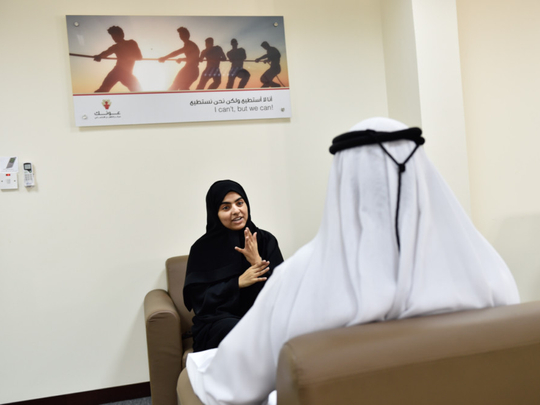
Dubai: In the nearly 20 years that Abdullah (full name withheld to protect identity) abused drugs, he wrecked six cars in one year, overdosed three times and was in a coma for 11 days.
The 38-year-old Emirati believes that God spared his life every time to drive home one message: Drug addiction is a disease and addicts need all the help they can get from society, especially their families.
“Drugs almost destroyed me. I know many addicts who were disowned by their families, got divorced and lost their jobs. Alhamdulillah, I am lucky,” Abdullah told Gulf News during a visit at Ownak Centre.
Ownak is Dubai’s first and only social rehabilitation centre under the Community and Development Authority for recovering drug addicts to prevent them from relapsing into substance abuse.
Abdullah checked himself at Ownak in September 2013 after being released from jail for drug use. After completing the centre’s programmes and taking related courses months later, Abdullah has been “clean” for three years and is one of Ownak’s success stories.
Now an assistant drug counsellor at the centre, Abdullah shares experiences with recovering addicts to help them on to the journey of total recovery. It hasn’t been easy, but it has been worthwhile, Abdullah said.
“Every time I see a newcomer, I go back to the beginning when I decided to quit. I see myself in the past,” said Abdullah, who started using drugs at 15 out of curiosity.
“We try to hunt the motivation which the client came here for — what is moving him to stop using and work on that motivation to make him stick to his decision to stop using drugs.”
That motivation was hard to come by for Abdullah. But when it did, there was no turning back for him.
From 2001 until 2013, Abdullah was in and out of prison four times for drug use. He was locked up in rehabilitation centres three times after episodes of drug overdose. He was hired and fired out of high-paying jobs countless times.
When his father died in 2012, he was reeling from the side effects of taking drug substitutes because he could not find his main drugs. Right after he buried his father and while at the cemetery, Abdullah got a call. His drugs were available but were 900km away.
“It meant that I had to cross the border. So I left everything — the people, my family, everything — after the burial and drove for 900km [to get the drugs].”
All throughout this period, doctors repeatedly asked him if he would stop using drugs. His answer was always a stern no.
Until death visited his family a second time.
“The decision to quit came when I was in jail in my last case. My brother died. I tried to go to see him and bury him. But they did not let me out of jail. So I thought, if I did not get to go and bury my brother, who’s next?”
“I realised that I was losing a lot; I’ve had enough. Alhamdulillah! God gave me the power to decide to quit.”
Through it all, one thing was constant: Abdullah’s family. The father of five said he had told his wife to leave and go back to her family many times. But she was as just stubborn as he was. She waited patiently until he quit and came home.
This is what made the difference in Abdullah’s journey. And addicts need the same to successfully recover, he said.
“Most of the family members refuse [to take in] addicts. They kick them out of the house. Families should be patient and society should give these people a chance.”
“Our message to society is addiction is a disease. We must help these people get well.”
Any problem in the recovering addict’s family could lead him to relapse, Eiman Ahmad Al Yahya, a social worker at the centre, said. The family and society should therefore not give up on the addict, however difficult the circumstance.
Exclusion never helps. It only pushes them further into addiction.
Al Yahya said the first two weeks to two months through the six-month programme is critical for the addict’s recovery and family support is just as crucial.
Currently, there are 10 clients enrolled in Ownak. Some 137 Emiratis aged 14 to 53 have taken the programme since the centre’s inception.
Twelve people have successfully completed the programme and are now back on their own feet, living clean lives with their family. Among them is Abdullah.
“When I see the clients here, I see how they suffered. It’s not easy to quit. They fight — a lot — to continue to be sober. Sometimes, I see fear. After the point that they’ve reached, they fear that they might lose it in seconds of weakness.”
“But I also see happiness, especially on both sides, for them and for me. I see the truth that there really is hope.”
What is Ownak?
What: Dubai’s first and only social rehabilitation centre aims to rehabilitate former drug-dependent Emiratis who have been admitted to local penitentiary facilities multiple times.
Objective: To develop the psychological and social skills of former drug dependents, give them after-care, periodic follow-ups, and ensure relapse prevention. The programme is free.
Where: Al Khawaneej,
Facilities: The one-storey centre has dedicated staff, including psychologists and a specialist
Contact: 800 2121








